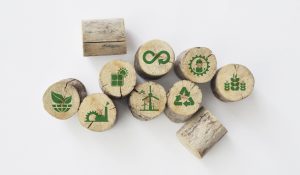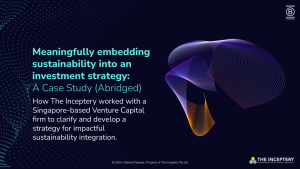A note from The Inceptery: A Deloitte research study from 2013 found that companies that pursue sustainability are much more able to develop innovative processes, products, and services to enable their sustainability strategies to come to life. The result of this is output that offer new features and benefits, grow the business, and also reduce environmental impact.
This company is totally proving it!

Overview/ Abstract
The Need: Having already honored the best industry-mandated conditions for workers, there was a need to move deeper into transforming the textiles sector, after seeing the huge negative impacts on the environment.
The Solution: Plastic bottles and the discovery that they can be spun into yarns, realizing that there were ways to create new fabrics and products, creating value using this excessive waste material.
The Challenges: There are numerous challenges: from heavy investment in R&D and marketing, significant time and effort spent in acquiring the initial small order with large organizations, higher prices for sustainable products due to production costs to lack of awareness for both consumers and businesses of environmental and humanitarian issues of the textile industry. Access to financing for sustainability-driven businesses – obtaining grants for creative and innovative ideas is still a big challenge.
The Benefits: New economic opportunity through a range of innovative solutions which transform waste into worth. Products that can be produced at scale in a variety of forms are suitable for both large corporations and small companies. Waste2Wear rigorously ensures that their workers flourish in humane and fair conditions with salaries above the standard – to ensure a living wage. There is great satisfaction in growing all aspects of one’s business sustainably, contributing not only to financial returns but also to the environment and society.
About the company/Background:
Waste2Wear was originally founded in Shanghai, China in 1998 by Mrs Monique Maissan – a then textile engineer, turned businesswoman of Vision Textiles.

Their business model is based on creating value from materials that are otherwise discarded and viewed as low value. Collecting the bottles takes care of the problem of environmental waste whilst creating equitable employment opportunities for those involved in making the products. The company is highly involved in the development of cradle-to-cradle manufacturing loops where customers – especially those who have high volumes of mainly disposable and semi-disposable products (originally purchased from Waste2Wear) – are encouraged to send back their garments so they can be used as a feedstock for the next-generation of products.
The business now operates on four continents, with a corporate goal to one day run out of plastic bottles. They have a wide range of products – from spun fabrics to sportswear, workwear, fashion, basics, uniforms, bags, and accessories. Their product line also includes home goods such as curtains, bedding, and pillows.
Customer education is an important feature – each product label indicates how many plastic bottles it took to make each particular item. Packaging solutions range from large orders combined into one box or bag, the use of recycled paper and biodegradable materials for individually-packed items to partnering with service providers such as RePack to develop new sustainable solutions for packaging.
Innovation for Waste2Wear is…
A very diverse set of activities and a process – from identifying needs and research to competitive/cost analysis to collaborative co-creation and testing all the way to production. Innovation is given utmost priority in the company. A significant amount of time (25-30%) and energy is spent by both Monique and her business partner Mr. Eduardo Garza Garcia, on continuous innovation, as they believe it is crucial for the thriving of the company.
Collaboration and support of new scientific and engineering developments: Waste2Wear has partnered with several universities and research institutes to support research to develop solutions to reduce and ultimately eliminate the release of micro-plastic from plastic-based textiles during washing into the environment. Waste2Wear’s own research shows that twisted yarns of very fine filaments are more resistant to shedding – there is 55 % less micro-plastic shedding from recycled polyester than from a virgin material (The Swedish Foundation for Strategic Environmental Research – Mistra, https://www.mistra.org/en/).
Waste2Wear uses both mechanical and chemical recycling of RPET from bottles, and Poly Propylene from used non-woven fabrics and bags and is now also looking at electro-spinning as a possible solution for recycling other plastics and even nylon. A recent Chinese import ban on plastic waste created a great need, and therefore a business opportunity, to pursue the development of new types of solutions to recycle plastic waste in different parts of the world.
Leadership on Circularity: Waste2Wear is committed to creating awareness and inspiring others to adopt Circular Economy through keynote speeches during conferences and master classes. “CircularFutures”- Leadership Development Program from Ashoka co-created with Waste2Wear, Philips, E-bay, and Circle economy, was designed to provide interactive and practical learning experiences for leaders in the industry, to inspire innovation, and to create real solutions through collaborations across the industry. Partnership with TU Delft supported by the Dutch Consulate in Shanghai links Dutch and Chinese universities, NGOs, and businesses in order to reduce pollution and encourage the adoption of circular economy business models.
Partnerships for new development: Mrs. Maissan is an advisor to the Demeto initiative- 35 million euros of EU funding (Horizon 2020 framework) to construct the 1st in world factory using microwave radiation to provide a solution for the world of textiles – to break down textile products made from plastic and plastic mixes, a process with zero negative impact on the environment, to create a feedstock for recycled materials.
Waste2Wear is engaging with MNCs (e.g. H&M, Ikea, Danone, and others) to join in collaborative efforts towards industry transformation.
The waste2Weave project in partnership with TARA, India is aimed at developing new fabrics for handlooms using recycled polyester in combination with natural yarns, to take plastic out of the environment and to empower women by providing them with the means to increase their income while improving their work conditions.
The Ocean Plastic project is an initiative that brings together universities, NGOs,s and companies in a joint effort to develop supply chains based on Ocean Waste. The project’s aim is also to conduct upstream research to identify pollution sources in order to support the advance of new industry standards and regulations and create alternatives, which do not have a negative impact on the environment www.waste2wear.com/ocean-plastic-project

Economic, social, and environmental benefits:
There is a growing market for Waste2Wear products in Singapore as currently there is very little recycled polyester or any other recycled products. There are a lot of opportunities in Singapore – being a small island the day-to-day waste is of a growing concern. Products like “green bags’ will take plastic bottles out of the environment as well as stop the need for plastic bags in shops and stores.
Government and other organizations with large numbers of workers could be actively “wearing their Corporate Social Responsibility (CSR)” by dressing their workers in garments (partly) made from recycled plastic. Rising awareness within and outside a company by sharing this kind of initiative on social media, using QR codes on the labeling to access information about the process and the product.
”How great would it be to have the Singaporean army or navy wear garments of ours?” – Asks Mrs. Maissan – helping to create awareness, becoming part of the solution, and setting an example to the world. Wheels have been already set in motion for this project in other countries.
Waste2Wear provides work garments for workers of large multinational companies. They report that the involvement of their own people to come up with creative sustainable ideas in the workspace has increased enormously.
Even greater impact can be achieved through new developments in Singapore where curtains, couches, and other homeware can all be made out of recycled polyester.
Last but not least: to dress Singaporean school children in our uniforms – to teach children that viewing waste as a resource is the only way we can preserve our planet and our future.
Growth and profitability for Waste2Wear are…
A business with a mission that is focused on protecting the environment and safeguarding humanitarian conditions and still making a good profit doing so.
The best part is that this business model is scalable and the company is proving it with its presence in nine countries. Scalability is important in order to drive the price down due to volume, as well as to establish a status of the ‘to go to’ company.
Working with agents and partners all over the world and boosting the company’s social media presence – all contribute to a buzz around this innovative company. But the most important part is that the company keeps creating innovative solutions and products that benefit the environment, and society and grow the business. “Our aim is to become ‘the intel inside’ of the recycling industry” – says Mrs Maissan.
One important element that keeps coming up in conversations with startups and small businesses with business models based on sustainability-led innovation is that there is an urgent need for new criteria in financial markets – criteria for evaluating and measuring environmental and humanitarian impacts. This will drive more investments in small businesses with creative and innovative ideas, which in turn will boost the growth of sustainable businesses.
Good business should be an easy business – growing Waste2Wear and making an impact creates awareness which creates customers’ demand for sustainably-produced products. Green business is good business and eventually should become the only kind of business.
The Boston Consultancy Group analysis predicts that green business will generate 156% yearly growth in the coming years.
Monique hopes that one day the company will become obsolete, as there would be no more plastic and other waste to be recycled using their current methods, and the model of “produce-consume-discard” will be fully replaced by the closed loop economy.






